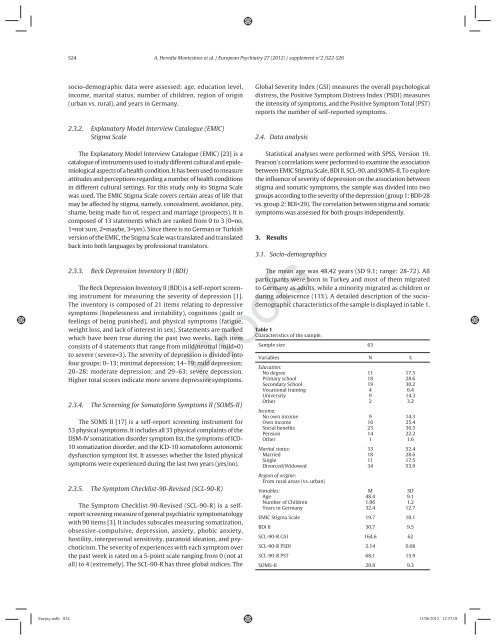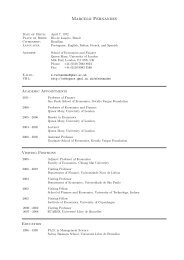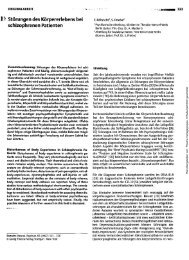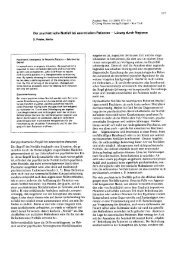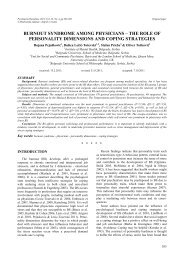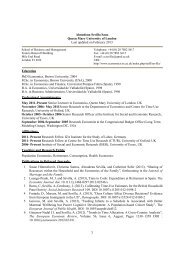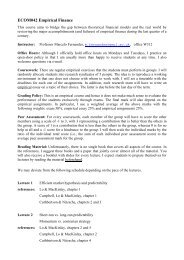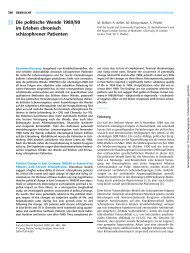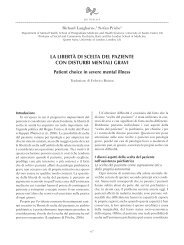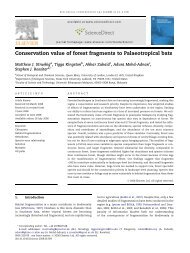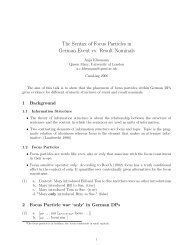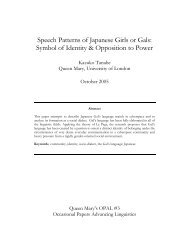Proofs - Personal Webspace for QMUL - Queen Mary, University of ...
Proofs - Personal Webspace for QMUL - Queen Mary, University of ...
Proofs - Personal Webspace for QMUL - Queen Mary, University of ...
Create successful ePaper yourself
Turn your PDF publications into a flip-book with our unique Google optimized e-Paper software.
S24 A. Heredia Montesinos et al. / European Psychiatry 27 (2012) / supplement n°2 /S22-S26<br />
socio- demographic data were assessed: age, education level,<br />
income, marital status, number <strong>of</strong> children, region <strong>of</strong> origin<br />
(urban vs. rural), and years in Germany.<br />
2.3.2. Explanatory Model Interview Catalogue (EMIC)<br />
Stigma Scale<br />
The Explanatory Model Interview Catalogue (EMIC) [23] is a<br />
catalogue <strong>of</strong> instruments used to study different cultural and epidemiological<br />
aspects <strong>of</strong> a health condition. It has been used to measure<br />
attitudes and perceptions regarding a number <strong>of</strong> health conditions<br />
in different cultural settings. For this study only its Stigma Scale<br />
was used. The EMIC Stigma Scale covers certain areas <strong>of</strong> life that<br />
may be affected by stigma, namely, concealment, avoidance, pity,<br />
shame, being made fun <strong>of</strong>, respect and marriage (prospects). It is<br />
composed <strong>of</strong> 13 statements which are ranked from 0 to 3 (0=no,<br />
1=not sure, 2=maybe, 3=yes). Since there is no German or Turkish<br />
version <strong>of</strong> the EMIC, the Stigma Scale was translated and translated<br />
back into both languages by pr<strong>of</strong>essional translators.<br />
2.3.3. Beck Depression Inventory II (BDI)<br />
The Beck Depression Inventory II (BDI) is a self- report screening<br />
instrument <strong>for</strong> measuring the severity <strong>of</strong> depression [1].<br />
The inventory is composed <strong>of</strong> 21 items relating to depressive<br />
symptoms (hopelessness and irritability), cognitions (guilt or<br />
feelings <strong>of</strong> being punished), and physical symptoms (fatigue,<br />
weight loss, and lack <strong>of</strong> interest in sex). Statements are marked<br />
which have been true during the past two weeks. Each item<br />
consists <strong>of</strong> 4 statements that range from mild/neutral (mild=0)<br />
to severe (severe=3). The severity <strong>of</strong> depression is divided into<br />
four groups: 0–13: minimal depression; 14–19: mild depression;<br />
20–28: moderate depression; and 29–63: severe depression.<br />
Higher total scores indicate more severe depressive symptoms.<br />
2.3.4. The Screening <strong>for</strong> Somato<strong>for</strong>m Symptoms II (SOMS- II)<br />
The SOMS II [17] is a self- report screening instrument <strong>for</strong><br />
53 physical symptoms. It includes all 33 physical complaints <strong>of</strong> the<br />
DSM- IV somatization disorder symptom list, the symptoms <strong>of</strong> ICD-<br />
10 somatization disorder, and the ICD- 10 somato<strong>for</strong>m autonomic<br />
dysfunction symptom list. It assesses whether the listed physical<br />
symptoms were experienced during the last two years (yes/no).<br />
2.3.5. The Symptom Checklist- 90- Revised (SCL- 90- R)<br />
The Symptom Checklist- 90- Revised (SCL- 90- R) is a self-<br />
report screening measure <strong>of</strong> general psychiatric symptomatology<br />
with 90 items [3]. It includes subscales measuring somatization,<br />
obsessive- compulsive, depression, anxiety, phobic anxiety,<br />
hostility, interpersonal sensitivity, paranoid ideation, and psychoticism.<br />
The severity <strong>of</strong> experiences with each symptom over<br />
the past week is rated on a 5- point scale ranging from 0 (not at<br />
all) to 4 (extremely). The SCL- 90- R has three global indices. The<br />
Global Severity Index (GSI) measures the overall psychological<br />
distress, the Positive Symptom Distress Index (PSDI) measures<br />
the intensity <strong>of</strong> symptoms, and the Positive Symptom Total (PST)<br />
reports the number <strong>of</strong> self- reported symptoms.<br />
2.4. Data analysis<br />
Statistical analyses were per<strong>for</strong>med with SPSS, Version 19.<br />
Pearson´s correlations were per<strong>for</strong>med to examine the association<br />
between EMIC Stigma Scale, BDI II, SCL- 90, and SOMS- II. To explore<br />
the infl uence <strong>of</strong> severity <strong>of</strong> depression on the association between<br />
stigma and somatic symptoms, the sample was divided into two<br />
groups according to the severity <strong>of</strong> the depression (group 1: BDI>28<br />
vs. group 2: BDI


